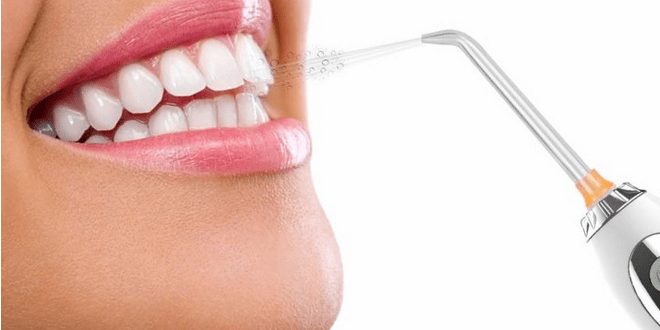Do water flossers work?
Brushing your teeth twice daily is important to maintain your oral health but there are many areas that your toothbrush cannot reach. Therefore, brushing alone is insufficient to maintain healthy gums and prevent decay in between your teeth. This is why we recommend for you to floss at least once a day as part of your daily routine. However, we often hear that our patients say that they don’t floss as often as they should, meaning they know it’s good for them but they avoid it anyway!
You may have seen a device on the market called a water flosser or an oral irrigator. This powered product is marketed as an item that can replace flossing. If you are struggling with maintaining a regular flossing routine, is a water flosser right for you?
What is a water flosser?
A water flosser is a motor-powered device that releases a stream of water from the tip with enough pressure to remove debris and clean around your teeth.
Some water flossers have a variety of different tips that vary the pressure and spray of the water for different cleaning purposes (for instance, an everyday tip, a tongue cleaner tip and an orthodontic braces tip). Multiple tips also allows different people in the same household to use the water flossing device hygienically. These tips are required to be changed periodically, just like a manual toothbrush or an electric toothbrush head.
Some varieties of water flossers can be used in the shower if they are cordless and waterproof. This is a great advantage as water flossing can be a messy process!
Water flossing vs traditional string floss – is it as good?
The short answer is probably not. While water flossing can push out large particles of debris and plaque, it can’t replicate the scraping action of string floss to disrupt the plaque biofilm on the tooth surface.
Think of it like washing a car – a car that has been cleaned by only a pressure hose is not as clean as one that has had a proper scrub and wipe down on all surfaces.
Therefore, it is not recommended to replace traditional flossing with water flossing. It is also certainly not recommended to replace brushing with just water flossing either.
So should I get a water flosser?
In most research, the use of water flossers have been shown to improve gingival health over using a toothbrush alone. Additionally, water flossers can be very beneficial in helping to clean around metal braces and implants where even good brushing and regular flossing can leave debris behind.
In most circumstances, a water flosser can be a good adjunct to your oral hygiene regime and can improve your gingival health.
But what if I struggle with using string floss?
Firstly, talk to your dentist about your flossing technique. We are always happy to show you our technique to remove plaque without damaging your gums.
There are many different varieties of floss on the market, such as waxed, unwaxed, string and tape. It may be necessary for you to trial some different types of floss to find which one works best for you.
For people who continue to struggle with the dexterity of traditional string flossing, consider using a flossette which is basically floss with a handle. This can make it much easier and quicker perform your flossing routine.
For some individuals especially those with gum disease, you may benefit from using an interdental brush. An interdental brush is a device that has the appearance of a small bottle brush and can be pushed in the spaces in between your teeth to clean the tooth surfaces. Interdental brushes come in a variety of sizes. Talk to your dentist about whether interdental brushes are suitable for you and what sizes to use.
Conclusion
Water flossing can help improve your gum health, but currently it can’t replace your traditional brushing and flossing. Flossing is an important part of your teeth cleaning routine, therefore if you are having trouble, talk to your dentist so we can help find a solution for you!







